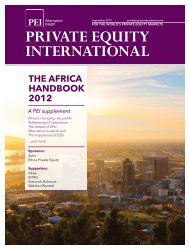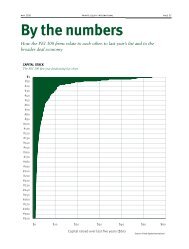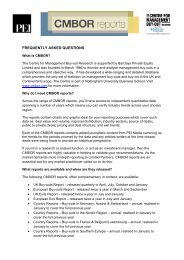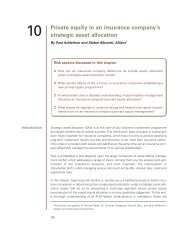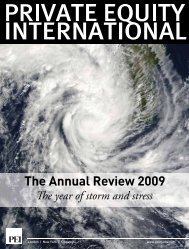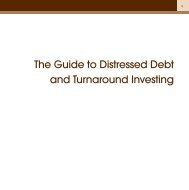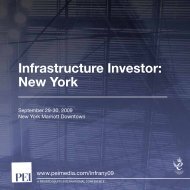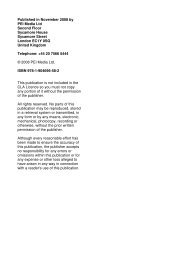Fundamentals of Private Equity and Venture Capital - PEI Media
Fundamentals of Private Equity and Venture Capital - PEI Media
Fundamentals of Private Equity and Venture Capital - PEI Media
You also want an ePaper? Increase the reach of your titles
YUMPU automatically turns print PDFs into web optimized ePapers that Google loves.
GETTING THE MOST OUT OF THIS MODULE<br />
Welcome to Module 7 in the <strong>Fundamentals</strong> <strong>of</strong> private equity series. This module<br />
focuses on the due diligence process. It is designed to work both as a st<strong>and</strong> alone<br />
section <strong>and</strong> as part <strong>of</strong> the whole series. The module necessarily draws upon topics<br />
reviewed in earlier modules, <strong>and</strong> seeks to avoid repetition <strong>of</strong> their content.<br />
However, for the benefit <strong>of</strong> the st<strong>and</strong> alone reader, a comprehensive glossary has<br />
been incorporated, which explains the background <strong>and</strong> use <strong>of</strong> private equity terminology.<br />
All terms which may require explanation or expansion are printed in<br />
bold, to indicate that there is a glossary entry for them.<br />
What is due diligence?<br />
In its simplest terms, we can define due diligence<br />
as the process <strong>of</strong> assuring that all the assumptions<br />
on which an investment or acquisition decision<br />
are based do, in fact, hold true; an exercise in validation<br />
or verification. In modern practice, however,<br />
it goes further than this, as the results <strong>of</strong> a<br />
thorough, detailed <strong>and</strong> focused series <strong>of</strong> reviews<br />
into a company’s markets, processes, finances,<br />
management, technologies, assets, intellectual<br />
property <strong>and</strong> customers will in many cases identify<br />
areas where improvements can be made, risks<br />
reduced <strong>and</strong> additional gains realised.<br />
The levels <strong>of</strong> competition in modern private equity<br />
markets dem<strong>and</strong> that investors must consistently<br />
add value in order to outperform. As we saw in<br />
Modules 4, 5 <strong>and</strong> 6 this added value is increasingly<br />
generated by identifying, instigating <strong>and</strong> driving<br />
performance enhancements, in t<strong>and</strong>em with the<br />
investee company’s management teams. To do this<br />
requires ever deeper underst<strong>and</strong>ing <strong>of</strong> markets,<br />
companies <strong>and</strong> strategic opportunities. The due<br />
diligence exercise can contribute to this underst<strong>and</strong>ing<br />
by providing essential raw material to<br />
inform the entire investment, growth <strong>and</strong> realisation<br />
process, rather than being seen as a tedious<br />
<strong>and</strong> non-productive hurdle between commercial<br />
decision making <strong>and</strong> completion.<br />
As with every aspect <strong>of</strong> private equity, the most<br />
valuable due diligence exercises are those where<br />
investors, their advisers <strong>and</strong> the management<br />
team are fully engaged, with shared objectives<br />
<strong>and</strong> complete openness.<br />
Types <strong>of</strong> due diligence<br />
Due diligence has evolved in depth, complexity<br />
<strong>and</strong> sophistication, <strong>and</strong> in modern practice is<br />
broken down into a series <strong>of</strong> different disciplines.<br />
Commercial due diligence<br />
Commercial due diligence (CDD), also referred to<br />
as market, or strategic due diligence, is focused on:<br />
• establishing the credibility <strong>of</strong> the revenue projections<br />
in the investee company’s business plan;<br />
• providing an objective, impartial assessment<br />
<strong>of</strong> the company’s markets <strong>and</strong> its position in<br />
them; <strong>and</strong><br />
• testing <strong>and</strong> evaluating the key strategic drivers<br />
in the company’s business plan.<br />
With the growing importance <strong>of</strong> earnings, or performance,<br />
enhancement as the route to value<br />
creation in the buyout market, a subset <strong>of</strong> CDD –<br />
operational due diligence – is becoming an<br />
increasingly prominent part <strong>of</strong> the process.<br />
As the Clinovia case study in Module 5 demonstrates,<br />
market due diligence need not be limited<br />
to specific investment proposals but can also be<br />
used as a tool for identifying attractive sectors or<br />
investment opportunities.<br />
Financial due diligence<br />
Whilst the focus <strong>of</strong> CDD is primarily external,<br />
financial due diligence (FDD) looks in detail at<br />
the company itself, providing a review <strong>of</strong>:<br />
• the company’s historic financial performance;<br />
• working capital movements <strong>and</strong> cashflows;<br />
• comparison <strong>of</strong> actual performance with forecasts<br />
<strong>and</strong> budgets;<br />
• the financial projections;<br />
• financial reporting <strong>and</strong> control systems;<br />
• tax compliance; <strong>and</strong><br />
COPYING WITHOUT PERMISSION IS UNLAWFUL<br />
THE FUNDAMENTALS OF PRIVATE EQUITY 5




